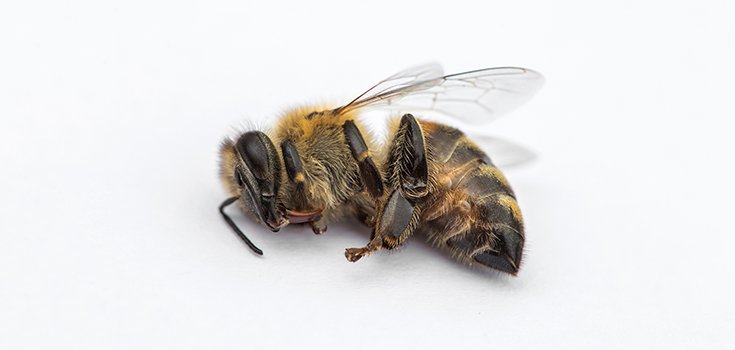Scientists Link Honeybee Deaths to Glyphosate in New Study

Glyphosate, the highly controversial weed-killing chemical found in the popular Roundup herbicide, is harming honeybee populations around the world, a new study shows.
Researchers at the University of Texas at Austin say glyphosate is making honeybees more susceptible to infection and death.
The study is published in the journal Proceedings of the National Academy of Sciences.
The authors write that bees who came in contact with glyphosate had lower levels of the healthy gut bacteria needed to digest food and prevent illness and were more likely to die from pathogens. When researchers introduced honeybees to the pathogen Serratia marcescens, approximately half survived. However, only 1/10 of bees affected by glyphosate survived.
Read: FDA Finds Glyphosate Herbicide in U.S. Honey
In a statement, Erick Motta, a graduate student who led the research, said:
“We need better guidelines for glyphosate use, especially regarding bee exposure, because right now the guidelines assume bees are not harmed by the herbicide. Our study shows that’s not true.”
The authors also called on those using glyphosate-containing products, including farmers and amateur gardeners, to stop applying glyphosate to plants that bees use to gather nectar. [2]
Though there are other factors that contribute to honeybee deaths, glyphosate bears some of the responsibility and the findings are especially concerning because the chemical is so widely used.
Glyphosate kills weeds by attacking an enzyme in a special pathway found in plants and some microorganisms. However, it was not believed to be harmful to animals and insects, including honeybees.
For the study, researchers collected honeybees with established gut microbiota and dosed the winged insects with glyphosate at levels equal to those found on crops. The bees were labeled to allow the researchers to track them. Then, they repeated the experiments on bees from a different hive.
Read: Landmark Report – Glyphosate is Most Heavily Used Herbicide in History
When the team examined DNA samples taken from the bees’ guts, they found that after 3 days glyphosate had decimated good bacteria in the honeybees’ digestive system – including a pathogen considered to be the ‘core bee gut species,’ Snodgrassella alvi.
Honeybees with healthy gut microbes were able to fight off Snodgrassella alvi. But the bees lacking in healthy gut microbes were more likely to die when they came in contact, the researchers said.
Dr. Nancy Moran, Professor of Integrative Biology at The University of Texas at Austin College of Natural Sciences who co-lead the study, explained:
“Studies in humans, bees, and other animals have shown that the gut microbiome is a stable community that resists infection by opportunistic invaders. So if you disrupt the normal, stable community, you are more susceptible to this invasion of pathogens.”
Dr. Dave Goulson, professor of biology at the University of Sussex, while praising the study’s methodology, questioned how bees could ever become exposed to glyphosate in the real world.
“Glyphosate kills plants, so contaminated flowers will soon be dead and of no interest to bees. Nonetheless, glyphosate is sometimes found in bee food stores, at concentrations similar to those used in this study.”
The results, he said, suggest that researchers and environmentalists have good reason to be concerned about the impact of glyphosate on the tiny yellow and black pollinators.
“It now seems that we have to add glyphosate to the list of problems that they face. This study is further evidence that the landscape-scale application of large quantities of pesticides has negative consequences that are often hard to predict.”
He noted that bees face numerous threats to their health, “including exposure to cocktails of insecticides and fungicides, impacts of pathogens, and effects of poor nutrition.”
Sources:
[1] USA Today
[2] Newsweek
